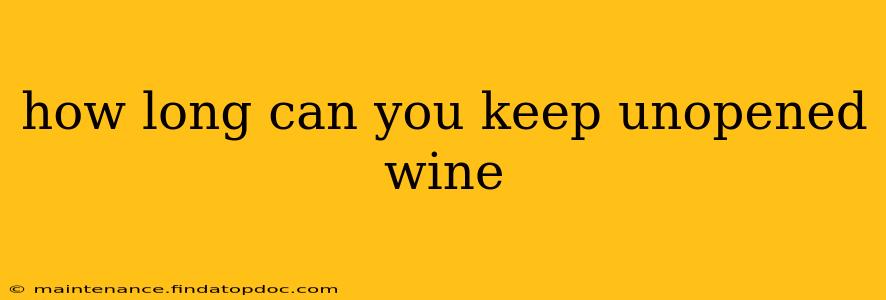How Long Can You Keep Unopened Wine?
The shelf life of unopened wine depends heavily on the type of wine and its storage conditions. While some wines can age gracefully for decades, others are best consumed relatively soon after purchase. This guide will help you understand how long you can keep different types of unopened wine and how to maximize its longevity.
What are the factors affecting how long unopened wine lasts?
Several factors influence how long you can store unopened wine:
-
Type of Wine: Fortified wines (like Port and Sherry) generally have a much longer shelf life than still wines (like Cabernet Sauvignon or Pinot Grigio). Similarly, red wines tend to age better than white wines.
-
Quality of the Wine: Higher-quality wines, made with better grapes and vinification techniques, often have longer aging potential.
-
Storage Conditions: This is crucial. Proper storage significantly impacts wine's longevity. Keep wine in a cool, dark, and consistently humid place. Fluctuations in temperature are detrimental.
-
Bottle Closure: Cork closures are generally preferred for aging, as they are more porous and allow for micro-oxidation, which can be beneficial for some wines. Screw caps, while convenient, may not be ideal for long-term aging for all wines.
How long can I keep different types of unopened wine?
Generally, you can expect these shelf lives under ideal storage conditions:
-
Fortified Wines (Port, Sherry, Madeira): These can last for decades, even centuries, especially higher-quality examples.
-
Red Wines: Many good-quality red wines will improve over 3-5 years, some even longer. However, inexpensive red wines are best consumed within 1-2 years.
-
White Wines: Most white wines are best consumed within 1-3 years, although some oaked Chardonnay or richer white blends may age well for slightly longer.
-
Rosé Wines: Rosé wines generally have shorter shelf lives than reds or whites, ideally consumed within 1-2 years.
-
Sparkling Wines: While unopened sparkling wines retain quality longer than still wines, the best quality is often enjoyed within 2-3 years for non-vintage wines. Vintage sparkling wines may age well for much longer.
How can I tell if my unopened wine has gone bad?
Even if stored perfectly, wine will eventually degrade. Signs of spoilage include:
-
Visible Sediment: A light haze or sediment is usually normal, especially in red wines, but excessive cloudiness can be a sign of spoilage.
-
Off-Odors: Sour, vinegary, or musty smells indicate the wine has spoiled.
-
Cork Condition: If the cork is pushed out or seems damaged, it could indicate a problem.
-
Taste Test (Once Opened): If the wine tastes flat, oxidized (like sherry), or simply unpleasant, don't hesitate to discard it.
What happens to wine that's been stored too long?
Over time, wine undergoes oxidation. This process can lead to a variety of changes, some subtle and some dramatic. The wine might become less fruity, more tannic (astringent), or develop a vinegary taste. Eventually, it will become undrinkable.
Can I freeze unopened wine?
Freezing unopened wine is generally not recommended. The expansion of water during freezing can damage the bottle and potentially alter the wine's flavor upon thawing.
Are there specific wine storage solutions I should consider?
Yes! For serious wine enthusiasts, dedicated wine cellars or wine refrigerators that maintain consistent temperature and humidity are excellent investments. If you don't have a dedicated space, a cool, dark, and stable location like a pantry away from direct sunlight or heat sources is a good alternative.
This guide offers general guidelines. Remember that individual bottles vary. Always refer to the producer's recommendations on the bottle if available. Paying attention to the cues, as outlined above, can ensure you enjoy your wine at its peak.
